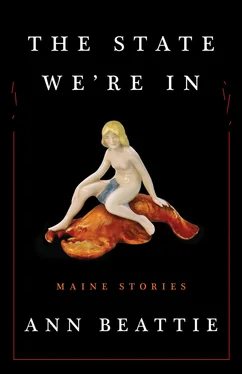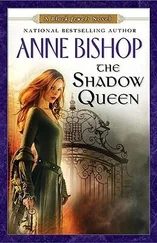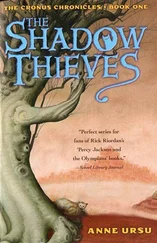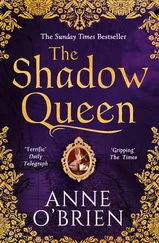“Well, yeah. One person’s T. G. and then there’s his brother Nathaniel,” she said. “It was T. G.”
“When did you find out about this?”
“The other day, on the beach,” she said. “If you call the hospital, they hear it in your voice you’re young. I thought maybe you could find something out.”
“My god, how absolutely terrible,” he said, picking up his cell phone. “The last time I saw Hank or heard anything from him was playing golf last week.” The phone was programmed with the number of the hospital. Also, the police. The surgeon he’d recently consulted about his leg. The butcher, the baker, the candlestick maker. No — none of them existed on his phone. As he’d entered the numbers, he’d dropped out so many names he felt he’d never call again; he didn’t have to scroll down far to find anything. “Patient information,” he said aloud. “Question,” he said. Jocelyn was holding a Scünci in her teeth, unwinding her braid. A small strand of hair pinker than the rest revealed itself, just as a human being came on the phone. He asked about the condition of a patient named Thomas Grant Murrey. Jocelyn ran her fingers through her bangs and felt them flop lightly onto her forehead again. T. G. had liked her pink streak, but not the bangs. She was growing them out. “M-u-r-r-e-y, correct,” her uncle said. “No, but if a family member is there, I’m a close friend of the boy’s father,” he said. He covered the mouthpiece. He whispered to Jocelyn, “Nobody’s there. That’s the good news and the bad news.” He listened for another few seconds. T. G. had been admitted, but there were to be no phone calls to his room. When her uncle thanked the person and hung up, he said, “I don’t know. You might be able to talk to him in the morning.”
“Why do you think so?” she said.
It was a reasonable question. My god, what poor Hank Murrey must be going through right now. This was also sure to put Nathaniel into a worse tailspin, to say nothing of Hank’s vain, high-strung wife, who acted like she lived with wild boars rather than with her husband and sons, lavishing all her attention on her only daughter. “Because in hospitals, they really believe in mornings,” he said. “It’s an old cliché, right? Everything might be better in the morning.”
“You think I might be able to talk to him because of a cliché?”
At such times — when she seemed to echo what he’d said, yet she’d missed his point — he was never sure if she was mocking him, or whether she truly did not understand what he’d tried to say. Was she a little thickheaded, or was she just, of course she was just , an adolescent.
“I meant that hospitals trust that most situations change by morning,” he said, a bit dully. She must be very upset about her friend. Why hadn’t she told him immediately? He wished he had something better to offer. He also wished to avoid surgery on his leg. He wished Bettina did not keep a diary — especially one that was so critical of him. He supposed he might also wish for no one to ever go to bed hungry anywhere in the world and for peace.
“So, you and my dad. You drank together, right?”
Where did that come from? He said, “We’d have the occasional beer. The drinking problem was mine, not his.”
“But you hung out together.”
“Yes. We sometimes worked together.”
“In a job you can’t talk about because you had a security clearance, but my dad didn’t.”
“Your father didn’t require a security clearance, no.”
“So were you smarter than he was?”
“Brighter? Than your father? I had great respect for your father’s intellect and perceptions. I went to military college, and he didn’t. It made our outlooks somewhat different.”
“But did you have the same outlook on girls?”
“What do you mean?” She was often very direct, though he suspected that most such questions were at some remove from what she really wanted to ask. She could certainly be just as difficult to talk to as Myrtis.
“I mean, did you pick up girls?”
“Before we were married? You’re asking if we dated women? How would I have gotten to know your aunt if we’d never gone out?”
She shrugged.
“That was what you were asking?” he said.
“Well, not if it makes you mad.”
“I’m not mad, I’m a little taken aback. True, I didn’t expect such a question. But yes, he and I went on a few double dates together, before I introduced him to Myrtis. As things turned out, I was sorry that I introduced him to her, but if I hadn’t, I suppose we wouldn’t have you, and that would obviously be terrible.”
“You say things to flatter me,” she said. “Can I ask you one more question? How did you go from your big important job to selling cars?”
He frowned. What could she mean? What was underlying that question? “Cars?” he said, genuinely puzzled.
“Mom said you were a used car salesman.”
“Then your mother was putting you on. I once had an office above a car dealership, but that’s hardly—”
“If you weren’t a salesman, then what were you?”
“It’s nowhere near as interesting as you’d like to think — or maybe as I’d like to think — but it’s not something I can talk about.”
“I wish I had a security clearance. There’s plenty of stuff I’d rather not talk about,” Jocelyn said. “Uncle Raleigh, does my mom just not tell the truth, or do you think she was confused because of where your office was?”
“I assume she was being sarcastic,” he said. “But I don’t know.”
“Whatever,” Jocelyn said. “So you won’t tell me what kind of women they were, either?”
“Tall and short. Educated and not. As your mother is fond of saying, the whole world is filled with people. If women came up to us in a bar, you could have a drink or a dance and not have sex, you know. It’s only in the movies that men like your father and I have sex all the time.” He might have said too much. “We might revisit this topic in a few years,” he said.
“But, so, I don’t get it about you and Aunt Bettina. She doesn’t seem anything like you.”
“At this age, people are nothing but their differences.”
She pulled the toe of her tights and let it go. Dust streamed into the air. She said, “Can I just call you Raleigh? It makes me feel like a baby, having to always say ‘Uncle.’ ”
“Fine with me,” he said. “Let’s continue this discussion in the morning, okay?”
“You’re going to save Mom’s house, right?”
“Please don’t feel that your home is going to disappear. That’s not going to happen, unless there’s an earthquake or a sinkhole.” He patted her ankle. “It’s summer,” he said. “What’s with the tights?”
“I’m growing my leg hair, and it’s at sort of an ugly stage.”
“I see. Well, good night.”
He was nothing like Bettina, Jocelyn thought. Bettina had given her mother different styles of Spanx for her birthday, which had been a total snark attack, and her mother hadn’t even realized it.
“Words are flowing out like endless rain into a paper cup. They slither while they pass, they slip away across the universe,” he half sang. “ ‘Across the Universe,’ by the Beatles. A group from London who became famous and appeared on something called The Ed Sullivan Show .”
“You’re being retarded. You know I know who the Beatles are,” she said, springing up, then looking back at him over her shoulder. Did any marriages make sense, or was he right about what he’d told her weeks ago, and there was a sort of use-by date stamped on them with an invisible watermark, like semen on the sheets?
* * *
In the parking lot outside the school, Jocelyn said to Ms. Nementhal, “I don’t know why I did what I did the other night. I think I was just scared. Like you’d think I was involved in some way.” What she was talking about was not saying hello, let alone offering to drive Ms. Nementhal home after the boys threw bottles from the car and broke the window of the pizza place. It had sort of flipped her out to see Ms. Nementhal so rattled.
Читать дальше












